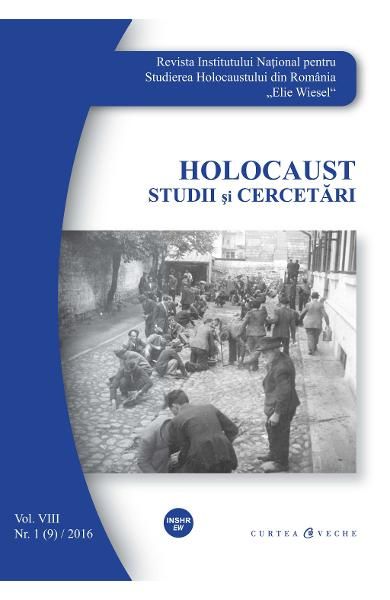Holocaust Nr.1/2016. Studii si cercetari
Revista Institutului National pentru Studierea Holocaustului din Romania Holocaust Nr.1 2016 Studii si cercetari.
Fragment din carte:
"In order to justify the existence of an institution which was novel for the Romanian constitutional order, the authors of the Treaty referred to the state of emergency which was manifest in Romania in 1940, the inadequacies of the traditional institutions to deal with political, economic, and social challenges and to the totalitarian fascist ideology. Hence, the period prior to the Antonescu regime was considered to have been marked by institutions which ruled inefficiently and could not keep pace with the new ideologies and the transformation of states worldwide. In a justification of Antonescu's rule marked by revolutionarism and messianism, the authors considered that, in the new era, when a gap existed between the evolution of nations and "the time's transformations", from the middle of "nations gifted with vitality and accountability before history, true leaders ascend, elitist spirits" which had the mission to "concentrate in their hands the entire expansion of a nation's life, give the people, through a unique, intelligent and decided power of command, the possibility to get rid of the remains of the past".
Lack of delays, obstacles, and hesitations were the virtues associated to the new political regime, in which "a single man thinks and decides and his power of command is transmitted through the state's bodies". The fundamental principle which circumscribed Negulescu and Alexianu's treatment of the new regime was the Conducator principle. The authoritarian rule exerted by him was considered to be in accordance with the "impetus of the people's community", which created and raised the Conducator. According to this thesis, the Conducator principle also ensured the elite's rule since Antonescu, through his will and acts, proved to be the "most typical expression of the people and its elite".
In contrast to other works in the field of constitutional law, Negulescu and Alexianu neglected the legal value of the royal decrees issued in September 1940, that had appointed Antonescu as a Conducator and established his prerogatives. "
Revista Institutului National pentru Studierea Holocaustului din Romania Holocaust Nr.1 2016 Studii si cercetari.
Fragment din carte:
"In order to justify the existence of an institution which was novel for the Romanian constitutional order, the authors of the Treaty referred to the state of emergency which was manifest in Romania in 1940, the inadequacies of the traditional institutions to deal with political, economic, and social challenges and to the totalitarian fascist ideology. Hence, the period prior to the Antonescu regime was considered to have been marked by institutions which ruled inefficiently and could not keep pace with the new ideologies and the transformation of states worldwide. In a justification of Antonescu's rule marked by revolutionarism and messianism, the authors considered that, in the new era, when a gap existed between the evolution of nations and "the time's transformations", from the middle of "nations gifted with vitality and accountability before history, true leaders ascend, elitist spirits" which had the mission to "concentrate in their hands the entire expansion of a nation's life, give the people, through a unique, intelligent and decided power of command, the possibility to get rid of the remains of the past".
Lack of delays, obstacles, and hesitations were the virtues associated to the new political regime, in which "a single man thinks and decides and his power of command is transmitted through the state's bodies". The fundamental principle which circumscribed Negulescu and Alexianu's treatment of the new regime was the Conducator principle. The authoritarian rule exerted by him was considered to be in accordance with the "impetus of the people's community", which created and raised the Conducator. According to this thesis, the Conducator principle also ensured the elite's rule since Antonescu, through his will and acts, proved to be the "most typical expression of the people and its elite".
In contrast to other works in the field of constitutional law, Negulescu and Alexianu neglected the legal value of the royal decrees issued in September 1940, that had appointed Antonescu as a Conducator and established his prerogatives. "
| Editura | Curtea Veche |
|---|---|
| ISBN | 2065-6602-9 |
| Număr de pagini | 336 |
| Formatul cărţii | 240 x 170 mm |
| Tip copertă | Necartonata |
| Data apariției | 2017 |

